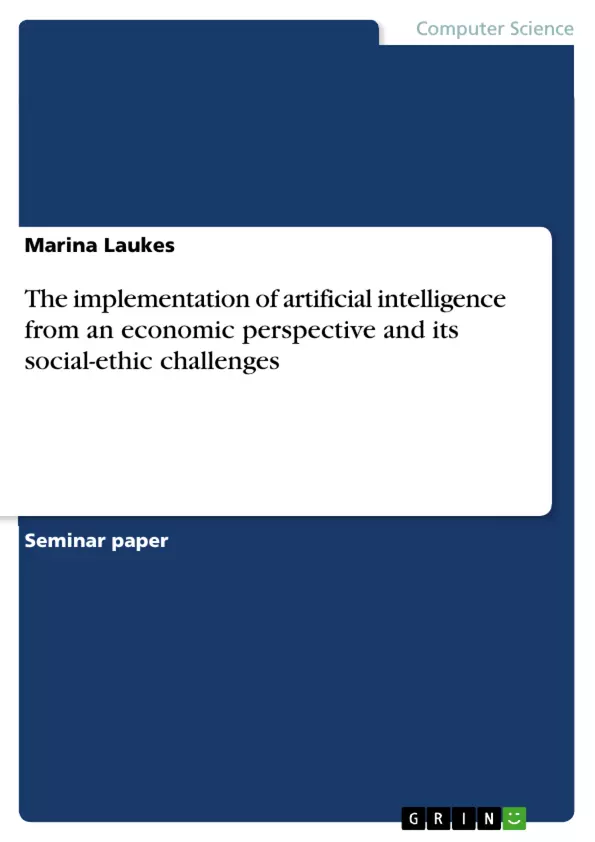This paper deals with the implementation of artificial intelligence from an economic perspective and considers its social-ethic challenges.
Can machines think? With these pioneering words, and the questioning in the so-called imitation game whether it enables machines to think autonomously, Alan M. Turing developed one of the first fundamental ideas of machine learning and its significance for the future as early as the 20th century.
Machine learning (ML) or also known as Artificial Intelligence (AI) is now no longer a dystopia that was only initially considered, it has evolved and is a tangible reality and immeasurable in all aspects of life. Due to the fundamental paradigm shift, massively marked by the emergence of digitalization and Industry 4.0, artificial intelligence, which is being used almost across the board, will play a key role in the coming decades.
The applicability of artificial intelligence and increasingly complex algorithms continues to shape our everyday lives, from smartphones and search engines to the financial and healthcare sectors. Beyond this, the use of machine learning has a major impact on the economy and its future, significant societal implications. AI is a highly topical issue because, despite promising technological progress, the use of AI is often controversial, especially with regard to whether the implementation of such technology is morally and ethnically acceptable and whether certain legal and normative boundaries are crossed.
Therefore, the aim of this research paper is to analyze how far the implementation of artificial intelligence will continue to have a decisive impact on economic events and cause change. Irrespective of this, it is also important to analyze the social-ethnic effects of the use of AI.
Inhaltsverzeichnis (Table of Contents)
- Introduction
- Defining AI
- Applications of AI
- Effect of AI on the Economy
- Social-Ethical Considerations
- Conclusion
Zielsetzung und Themenschwerpunkte (Objectives and Key Themes)
This research paper aims to explore the multifaceted impact of artificial intelligence (AI) on the economy and society. It examines the economic benefits and challenges posed by AI implementation, while simultaneously analyzing its social-ethical implications.
- The definition and evolution of AI, including distinctions between weak and strong AI.
- The diverse applications of AI across various sectors, including healthcare, agriculture, and industry.
- The economic effects of AI implementation, including its potential impact on GDP and productivity.
- The social-ethical challenges associated with AI, including concerns about privacy, bias, and job displacement.
- The role of regulation and policy in shaping the responsible development and deployment of AI.
Zusammenfassung der Kapitel (Chapter Summaries)
- Introduction: Introduces the topic of AI and its growing importance in the 21st century. It outlines the paper's objectives and scope, highlighting the economic and social-ethical considerations surrounding AI implementation.
- Defining AI: Provides an overview of the concept of artificial intelligence, exploring various definitions and classifications. It delves into the distinction between weak and strong AI, emphasizing the current state of AI development.
- Applications of AI: Explores the diverse applications of AI across various sectors, highlighting its potential to revolutionize industries such as healthcare, agriculture, and manufacturing. It analyzes the ways AI can be used to optimize processes and improve efficiency.
- Effect of AI on the Economy: Examines the economic impact of AI implementation, discussing its potential to increase GDP and productivity. It explores the role of investment in AI technologies and analyzes the potential impact of AI on economic growth.
Schlüsselwörter (Keywords)
Artificial intelligence, machine learning, deep learning, economic impact, social-ethical implications, automation, productivity, job displacement, regulation, policy, privacy, bias, ethics.
Frequently Asked Questions
Can machines think according to the Turing Test?
Alan Turing's "imitation game" was designed to see if a machine could exhibit intelligent behavior indistinguishable from that of a human, laying the foundation for modern AI discussions.
What is the difference between weak and strong AI?
Weak AI is designed for specific tasks (like Siri or search engines), while strong AI (AGI) refers to a theoretical machine with human-level intelligence across all domains. Currently, only weak AI exists.
How does AI impact the global economy?
AI has the potential to significantly increase GDP and productivity by automating routine tasks, optimizing supply chains, and enabling new data-driven business models.
What are the main ethical challenges of AI?
Key ethical concerns include algorithmic bias, the loss of privacy through mass data collection, and the potential for large-scale job displacement due to automation.
In which sectors is AI currently being applied?
AI is widely used in healthcare for diagnostics, in agriculture for precision farming, in the financial sector for risk analysis, and in manufacturing (Industry 4.0).
- Quote paper
- Marina Laukes (Author), 2022, The implementation of artificial intelligence from an economic perspective and its social-ethic challenges, Munich, GRIN Verlag, https://www.grin.com/document/1265334



